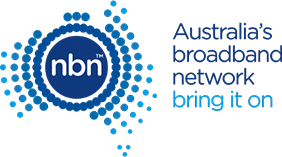Speed Test
Check your internet speed with our Ookla Speed test.
Internet speed refers to how much data and information can be transferred over the web on a single connection at any given time. Internet Speed is important for users because the speed of your connection determines what type of activities you can do online, as well as how many devices you can connect at once. If your internet is too slow, you may run in to trouble per forming tasks like streaming video, playing games or sharing large files.
Speeds are affected by various reasons. This includes the type of nbn™ connection you have, how you connect to your nbn™ service, and how many devices are connected at once. Other factors include quality of internal wiring and copper lines and distances to the node (FTTN), nbn tower capacity for Fixed Wireless services and time of day.
Speed is always best tested using a hardwired connection to your modem/router, or even better directly to your nbn NTD if your service uses one. SkyMuster Plus customers use the nbn™ PLUS TEST page to check your speed.
What do all the numbers mean?
Ping: Also referred to as latency, is the measurement of the delay in data transfer from one point to another. For most nbn™ services a ping under 80ms is great. Fibre services will see pings usually below 20ms, whereas satellite services will often ex ceed 550ms as the data travels epic distances to space.
Jitter: Refers to quality of a connection or delay between data packets being sent across the connection. Low jitter is best, and typically jitter less than 30ms is desired
Download (mbps): Is the speed in “Megabits per Second” that your connection is able to receive a file at. The higher this number the faster your connection is.
Upload (mbps): Is the speed in “Megabits per Second” that your connection is able to send a file at. The higher this number the faster your connection is.

Tips & tricks to improve your internet
Reset your network .It seems simple but sometimes just resetting your network is all it takes. All you need to do is power off your modem/router and any other network devices such as switches for 30 sec, then back on again. Just like computers these devices have processors and run out of memory. A quick power cycle refreshes things.
Move your modem/router. Placing your modem or router in a centralized location will improve signal throughout your home. Antennas work omni directional, so imagine the signal being a donut and your router is the hole in the middle. If you have a larger home, consider installing wi-fi access points connected to your router or a mesh wi-fi system. We doo not recommend the use of wi-fi repeaters
Use Ethernet instead of Wi-fi. Where possible connect devices such as computers, TV’s and game consoles directly to your router using ethernet cables. This not only provides a more stable connection, but also frees up any bandwidth in your wi-fi signal—meaning less wi-fi congestion for those devices relying on wi-fi such as tablets or devices you cant connect by ethernet.
Upgrade your modem/router. We recommend dual band wireless routers, with at least AC1200 specification. The bigger the number, the higher the bandwidth available for wi-fi users on your network. Cheaper routers may not offer enough wi-fi bandwidth, which ultimately causes a slower connection over wi-fi.

